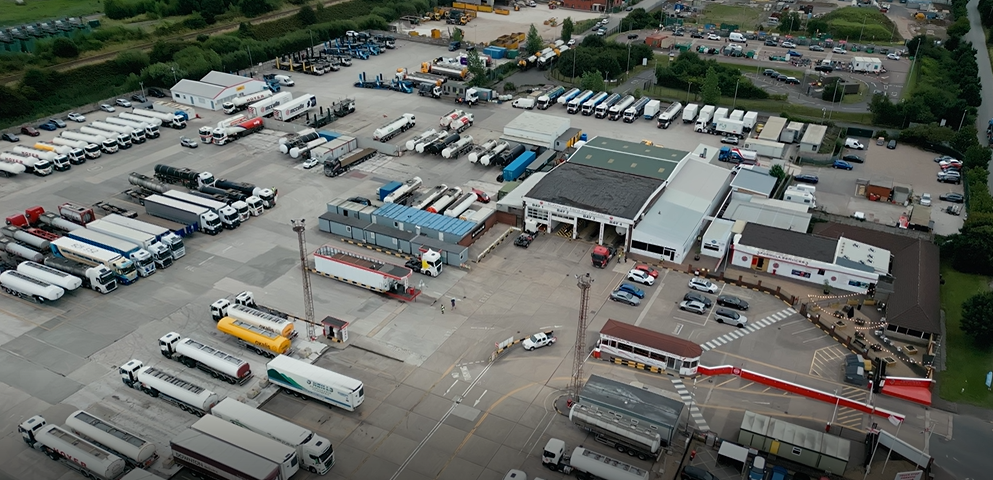
Josh Cousens
Die Rolle des Flottenmanagements im Lkw-Verkehr: Warum es wichtig ist
Erstellt: 26.02.2025
•
Aktualisiert: 26.02.2025
In der schnelllebigen Welt der Mobilität und des Straßentransports ist ein effektives [Flottenmanagement] (https://snapacc.com/fleet-operators/) von entscheidender Bedeutung, um Lkw in Bewegung zu halten, Kosten zu senken und die Effizienz zu steigern.
Ganz gleich, ob Sie einen kleinen Fuhrpark betreiben oder ein großes Speditionsunternehmen leiten, die richtige Fuhrparkmanagement-Software kann die Verwaltung von Fahrzeugen, Fahrern und Betriebskosten eines Unternehmens grundlegend verändern.
Effizienter Betrieb
Das Flottenmanagement ist von entscheidender Bedeutung, um sicherzustellen, dass die Lkw pünktlich und kosteneffizient dort ankommen, wo sie gebraucht werden.
Das Fuhrparkmanagement minimiert Verspätungen und reduziert unnötige Ausgaben, indem es die Leistung der Fahrzeuge, den Kraftstoffverbrauch und die Aktivitäten der Fahrer verfolgt.
Ohne einen strukturierten Ansatz riskieren Flotten Leistungsprobleme, die zu höheren Betriebskosten und geringerer Rentabilität führen können.
Wie verbessert das Flottenmanagement die Sicherheit der Fahrer und die Einhaltung der Vorschriften?
Fuhrparkbetreiber machen sich große Sorgen um das Wohlergehen der Fahrer. Ein gut gemanagter Fuhrpark sorgt für ordnungsgemäß gewartete Fahrzeuge, optimiert die Routen, um Ermüdungserscheinungen zu vermeiden, und hält sich an die Vorschriften.
Flottenmanagement-Software hilft Unternehmen, das Fahrerverhalten zu überwachen, Sicherheitsrichtlinien durchzusetzen und das Risiko von Unfällen oder Strafen bei Nichteinhaltung zu verringern.
Wie kann das Flottenmanagement die Betriebskosten von Speditionsunternehmen senken?
Einige der wichtigsten Kosten im Transportgewerbe sind Kraftstoffkosten, Fahrzeugwartung und Ausfallzeiten.
Die Implementierung von Lösungen für das Fuhrparkmanagement hilft den Betreibern, den Kraftstoffverbrauch zu verfolgen, effektive Routen zu planen und sicherzustellen, dass die Fahrzeuge zur richtigen Zeit gewartet werden, um kostspielige Ausfälle und ungeplante Reparaturen zu vermeiden.
Mit den richtigen Daten können Fuhrparkmanager fundierte Entscheidungen treffen, die unnötige Kosten senken und die Rentabilität verbessern.

Wie können Flottenmanagementsysteme die Nachhaltigkeit im Lkw-Verkehr unterstützen?
Das Thema Nachhaltigkeit gewinnt in der gesamten Transportbranche zunehmend an Bedeutung. Flottenmanagementsysteme ermöglichen es den Betreibern, Emissionen zu verfolgen, die Kraftstoffeffizienz zu überwachen und umweltfreundliche Fahrweisen einzuführen, die die Umweltbelastung verringern.
Flotten können datengesteuerte Lösungen nutzen, um strategische Anpassungen vorzunehmen, die mit den Branchenvorschriften und den Nachhaltigkeitszielen des Unternehmens übereinstimmen.
Was sind die größten Herausforderungen bei der Vergrößerung eines Fuhrparks?
Die Vergrößerung einer Lkw-Flotte bringt Herausforderungen mit sich, wie die Bewältigung der zunehmenden logistischen Komplexität und die Aufrechterhaltung der Produktivität. Hier sind einige Herausforderungen, auf die Fuhrparks bei der Vergrößerung ihrer Flotte stoßen können.
- Wenn Flotten wachsen, werden fortschrittliche Terminplanung, Routenoptimierung und Wartungsplanung unerlässlich, um Verspätungen und Ausfallzeiten zu vermeiden.
- Darüber hinaus wird die Einhaltung von Sicherheitsstandards und -vorschriften mit zunehmender Flottengröße immer schwieriger, was das Risiko von Problemen und Strafen erhöht.
- Die Skalierung erfordert auch erhebliche Investitionen in die Infrastruktur, z. B. die Einstellung und Schulung weiterer Fahrer und die Aufrüstung der Flottenmanagementsoftware.
Wie SNAP das Flottenmanagement unterstützt
Wir bei SNAP verstehen die Herausforderungen, mit denen Flottenbetreiber konfrontiert sind. Unser Netzwerk digitaler Lösungen für die Mobilitätsbranche hilft Unternehmen, ihre Abläufe zu rationalisieren und die Sicherheit und den Komfort der Fahrer zu verbessern.
Wir bieten Zugang zu einem wachsenden Netz von Park- und Waschplätzen in ganz Europa und helfen Flotten dabei, ungeplante Stopps zu reduzieren, die Produktivität ihrer Routen zu steigern und die Lkw ohne Verzögerungen weiterfahren zu lassen.
Da sich die Technologie für das Flottenmanagement weiterentwickelt, sind wir bestrebt, innovative Lösungen anzubieten, die den sich ändernden Anforderungen der Branche gerecht werden.
Flottenmanagement-Software und datengestützte Erkenntnisse helfen Speditionsleitern, den Betrieb zu rationalisieren, Ausgaben zu senken und sicherzustellen, dass ihre Flotten ihr volles Potenzial ausschöpfen.
Abschließende Gedanken
Fuhrparkmanagement ist mehr als die Überwachung von Fahrzeugen. Es geht darum, strategische Entscheidungen zu treffen, um die Effizienz zu steigern, Risiken zu verringern und das langfristige Unternehmenswachstum zu unterstützen.
Mit dem richtigen Ansatz für das Lkw-Flottenmanagement können Betreiber die Herausforderungen der Branche meistern und den reibungslosen Betrieb ihrer Flotten sicherstellen.
Suchen Sie nach weiteren innovativen Flottenmanagementlösungen? Entdecken Sie, wie die Dienstleistungen von SNAP Ihren Betrieb optimieren können. Entdecken Sie unsere Lösungen noch heute.



